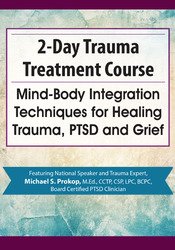

Are you confident in your clinical work with clients suffering from trauma or PTSD?
Or do you have a pit in your stomach after a session with a traumatized client because you fear that you may have done more harm than good?
Despite our best intentions, clients are often triggered or even retraumatized by talking about their experiences before they have the skills to regulate their emotions, calm their bodies and focus on the present.
This common treatment pitfall can lead to client’s withdrawing from the experience, avoiding their thoughts and feelings, or ending therapy all together. By incorporating mindfulness skills, clinicians can help clients to tolerate distressful memories, triggers and emotions in-order-to successfully begin to navigate their trauma narrative and move into post-traumatic growth.
Watch this recording and you will take away evidence-based, best-practice clinical interventions based on the neuroscience of traumatic stress with effective mind-body treatment approaches to have better clinical outcomes! Leave this course with more confidence in your trauma work!
This online program is worth 11.75 hours CPD.
| File type | File name | Number of pages | |
|---|---|---|---|
| Manual (4.82 MB) | 127 Pages | Available after Purchase |
Michael S. Prokop, M.Ed., CCTP, CSP, LPC, BCPC, is a national speaker, Certified Clinical Trauma Professional, Consulting School Psychologist, Licensed Professional Counselor, American Psychotherapy Association Board Certified Professional Counselor-Diplomate, Sports Psychology Consultant and is a member of the International Association of Trauma Professionals (IATP). He specializes in grief and trauma therapy, relaxation therapy, rational emotive psychotherapy, anger management, mental toughness training, and more.
As a consulting psychologist he has conducted hundreds of psychological evaluations of traumatized clients and continues to provide individual and group therapy for clients with various adjustments, intellectual, motivational and emotional challenges. His clinical expertise with traumatized clients is based on a long history of comprehensive professional experiences. These include providing support for children and families impacted by suicide, domestic violence, homicide, child abuse, sexual assault and accidental death.
Michael has authored three children’s books regarding adjustment issues and his counseling experiences include more than 25 years in private practice, school districts, part time at The Developmental Clinic, and the rest at Kent State University teaching undergraduate psychology classes, graduate level workshops and also providing psychological counseling services for the T.R.I. Program (Toward Retention Intervention). Besides his private practice, he consults in numerous schools and agencies and is an Adjunct Professor at Ashland University. As an entertaining and enthusiastic speaker, he frequently lectures and provides seminars at state and national conferences.
Speaker Disclosures:
| 5 |
|
| 4 |
|
| 3 |
|
| 2 |
|
| 1 |
|
Satisfaction Guarantee
Your satisfaction is our goal and our guarantee. Concerns should be addressed to info@pesi.co.uk or call 01235847393.
Please wait ...